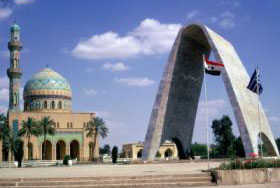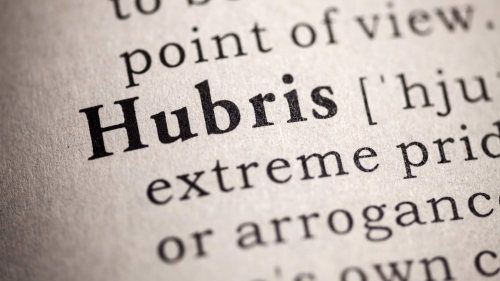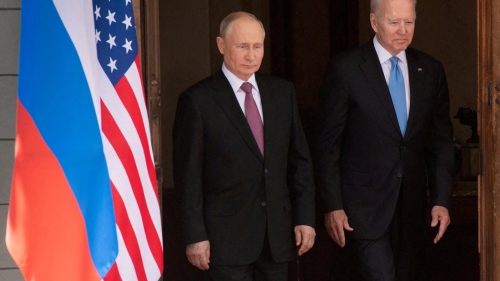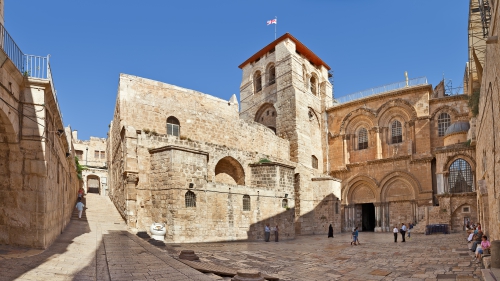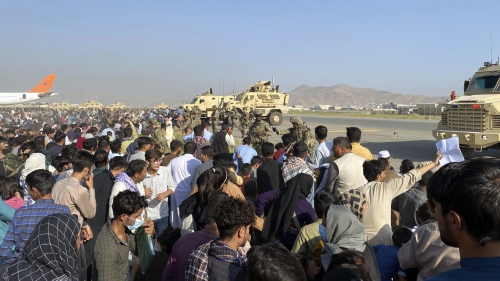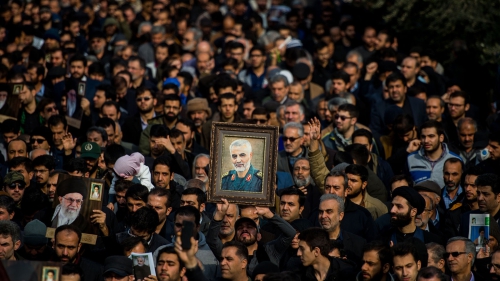Don't Separate Mosque and State
|
|
The United States should cease promoting a secular civil society as the only alternative to a Taliban-like theocracy in Iraq. We cannot quell the religious yearnings of millions of Iraqis merely by fostering democracy and capitalism.
The most effective way to counter a theocracy is to promote moderate, liberal religious institutions.
The 1st Amendment's separation of church and state is not a foreign policy tool; it's a peculiar American conception. Just because the American government is banned from promoting religion within the U.S. does not mean that it cannot promote it as part of a civil society in Iraq or Afghanistan.
I know a bit about how receptive Shiites (and arguably also Sunnis) are to moderate Islam because they laid out their position during a three-day meeting in Iran that I attended a year ago. It was organized by reformers, but hard-liners also participated. The main point, repeatedly stressed during the meeting, was that both camps want to live in an Islamic society. The hard-liners are committed to enforcing the religious code by the use of moral squads, secret police and jails, while the reformers favor encouraging people to be devout. "If you do not force people to come, they will want to come," they said.
Liberal Islam is spiritual and social rather than political. Indeed, it differs from the rigid authoritarian version much as liberal Protestants differ from Southern Baptists, and Reform Jews differ from ultra-Orthodox ones, although by a higher order of magnitude.
What would a pro-Islam policy look like in Iraq?
Instead of demanding that the current madrasas be replaced by wholly secular schools, as Sen. Joseph Biden has suggested, we might favor the inclusion of religious electives in public schools (as long as the teachers are qualified, which entails tolerance for a diversity of viewpoints). We could allow the funding of social services through religious organizations, as long as the funds are used for social and not political or religious purposes (call them faith-based institutions). And we could allow the state to pay the salaries of clergy and for the maintenance of places of worship, as do most democracies (other than the U.S. and France).
One may ask, "What about Christians and those who do not wish to adhere to any religion?" A religious society, as opposed to a religious state, can tolerate nonbelievers. It is the difference between enforcing adherence to a religious code and merely supporting it as one alternative. If this sounds abstract, consider that in the U.S. you can be legally married by religious authorities or government authorities, despite our insistence on the separation of church and state.
Favoring liberal Islam as an antidote to fundamentalist Islam is not to be confused with a related but different issue, whether Islam is compatible with democracy. I take it for granted that Iraq can and should have a democratic form of government. However, it should not treat religion as a threat but, potentially, as one mainstay. The current U.S. position ignores that potential.
The 13 points released by U.S. Central Command - that the rule of law be paramount, for instance, or that the role of women be respected - are fine, but they all speak only to secular issues. Whether deliberately or unwittingly, they reflect the concept of the "end of history" - that all ideologies are on their last legs as the world embraces the American version of democracy, human rights and the free market.
This idea, in turn, is an extension of the Enlightenment conceit that modernity is based on rational thinking. Irrational religion, then, belongs to history, and secularism - reason and science - will govern the future.
However, as we are learning all over the world, people have spiritual needs that cannot be addressed, let alone satisfied, by Enlightenment ideas. We see the explosive growth of Christianity in East Asia and Africa, a resurgence of religion in Russia and other former communist nations in Eastern Europe and a rise in Islam even in countries that had extensive secular, modern periods - most tellingly, in Turkey. People ask: Why are we cast into this world? Why are we born to die? What do we owe our children, our elderly parents and our friends and community?
Neither democracy nor capitalism speaks to these issues. Hence for the many millions of people there is religion, hard-line or moderate. Which one we should favor is clear, as long as we can get off our Enlightenment horse.
Amitai Etzioni, a sociologist and professor at George Washington University, is the author of "My Brother's Keeper: A Memoir" (Rowman & Littlefield, 2003).
Related Suggestions
Islam is a complete way of life as Muslims are fond of saying. Therefore if, right from the start, we don't seperate mosque and state, Islam will intrude into the politics, economics and social aspects of Iraqi life.
For example, can Iraq pass a law allowing Iraqis to choose any religion they wish? In Islam, the penalty of apostasy is death. This is against human rights in a secular state.
Can women have equal rights with men? If so, does that mean that women can have 4 husbands? If women do not have equal rights, the need to educate them is less for parents. This means that half the workforce is not fully tapped making the country economically less competitive. Women would be foced to depend on their sons for their old age, encouraging a high birth rate. A high birth rate makes poverty eradication difficult. This is one reason why so many Muslim countries are poor.
On a related subject, can Iraq pass a law banning marriages below say 18 years? Some Muslims object to this because Prophet Mohammed (pbuh) married 9 year old Aisha. Early marriages of course interferes with education which is important for progress.
What about banking and credit? All modern economies need credit to operate. This hinders progress.
What about application of hudud laws? Stoning is applied to adulterers wheras muderers have a chance to escape if the victim's family agrees to blood money. I think murder is a more serious crime than adultery. Also stoning is a painful way to die which is also against human rights.
I could go on. But you get the idea. It is better to use human reason to make modern laws than to rely on a long dead prophet (pbuh). Things have changed. Otherwise Muslim societies will fall further behind.
a) Verbal Hadith (What Prophet Muhammad (SAAW) spoke)
b) What Rasool-Allah (SAAW) showed by actions
c) The actions of the Sahabas (Companions of the Prophet) in the presence of the Holy Prophet (SAAW), or what was not done in his presence, but was brought to his attention, and did not criticize it or refute it, but remained silent about it, where the Holy Prophet(SAAW) authenticated it.
Beside the Islamic injunction to drop your weapons once your enemy has dropped theirs. Something that is difficult. There is a second danger in this fundamentalism. The Jews of Jesus time had created a "Mishna" a second set of religious commandments for themselves. These put a great burden on the people and shifted their attention from the worship of God to the enactment of ritual. The first error in this is the arrogance of raising human created commandments to the level of Divine commandments. The second error is misplacing one's attention away from God. The third is making worship into a burden. Jesus was sent to rebuke the Jews for doing this. In a way Islam has already created a Mishna in the hadith. If Muslims misplace their worship of God with the rituals and even oppressions of human interpretations of the hadith then they have fallen into the same trap as the Jews of Jesus' time. Fundamentalism may easily cross into this form of innovation. Happy is the man that learns from another's mistakes.
We have seen what Democracy and Secularism have achieved and done for countries where the majority are Muslims such as Algeria, Turkey and Egypt - Nothing. Amusingly even in the great bastion of Democracy and Secularism, the US, democratic vote did little to reflect the voice of the people, in fact the real events shattered claims of those who championed secularism, in that that it would bring about fairness and order - Bush was elected magically. In Algeria and Turkey the people made their choice and in each case election results were overturned, political leaders imprisoned and the army took over - installing their version of democracy - Might is Right. So what did the West, the great champions of Democracy do then ? did they protest, censure, impose embargoes on these countries for violating the principals they were croaking about all along ? No. In fact not many people know what happened in Algeria or Turkey and the Western media ensures that they remain ignorant and also do not care. In my opinion Democracy and Secularism are valid but to the exclusion of Islam and Muslims or their concerns and needs. As long as it is a means to lull anxious Muslims crowds -just long enough to steal their oil and then the natives can right well kill themselves for all they care. I say leave Muslims and their resources alone. Leave our countries alone. Leave our systems alone. Let us decide which path to take. Islam has never ever been given a chance. The much touted Taliban Islam was just a rouse to embarrass and demonize Muslims and Islam by the West. Islam is not that, It is so much more. If only they would abandon their prejudices for once and read and understand Islam for what it is.
A lie travels half way around the world before the truth has a chance to get it's shoes on.
To ask the question,'Is Islam compatible with democracy',is like saying that there can be another doctrine or way of life that is better than what Allah revealed. If the Muslims of Iraq, or any other Muslim, choose to folow The Shari`ah in all of their dealings,Al-Hamdu Lillahi for them,that is their choice.If one wants to think about what American-style democracy is based on, consider these words: A government of the People, for the People, and by the People. Allah, The Creator of the People,is no where mentioned. As Muslims who believe in the truth of the Quran, we should come into a mutual agreement about how The Mu'minuun should live and die: As Muslims submiting completely to Allah's Will. So in closing I leave with Allah's words," Do they then seek after a judgment of (the days of) ignorance? But who, for a people whose faith is assured, can give better judgment than Allah. Surah 5,Ayah 50
What is being muslim?
Isn't it saying there
is no god but the god
and mohamad
is his prophet?
Is it praying 5 times a day on time according to the Hadeeth?
Fasting according to the hadeeth?
Trying to attend Hajj if possible?
Giving to the poor in excess of 2.5 percent?
Telling others of your beliefs?
Dressing modestly?
Not using intoxicants or eating pork?
And defending the faith if someone is explicitly trying to destroy it?
Do not slay your children?
Other than this what is Islam?
How can you say lberal or conservative Islam
and where does "secularism" not fit into this picture?
Where is the inherent conflict of these basic things with a religiously naive government, after all these things are on the people to do for themselves and not on the government to make them do...
As it has developed, Islam has become a very efficient power machine with very little control mechanisms. Using it, people hungry of power can relatively easily come to power, without having acquired the necessary maturity. People looking for power are always potentially dangerous, because everyone makes mistakes, and powerful people make big ones. That is why the structure of power within the state ought to screen out such people striving for power who are not capable of profoundly respecting others. Here, experience undeniably shows that democracy makes a much better job than any theocracy, and that Islam probably has the worst modern track record of all theocracies in respecting people's freedom. That won't change just because of the promises of some moderate Muslims.
The backlash of "fundamentalism" is understandable but regrettable and unacceptable. It is a standard practice among detractors to push people into rash action and then declare them irrational and socially unacceptable. Consider the American solders technique of breaking an Iraqi defenders cover. They would insult the Iraqi's family and when the Iraqi would inevitably stand up to return the insult they would shoot him in the head. This in miniature is what has been happening nation wide in the Middle East.
Consider that the way of polytheism is hierarchal domination/control while the way of monotheism is universal service/empowerment. A nation with distributed infrastructure and universal cooperation cannot be dominated by force of arms. A society of cosmopolitan service and all-embracing empowerment cannot be coerced. Alternatively, the monarchies and dictators the West embraces are single points of leverage over the whole of a nation. The wish for a messiah, kalifa, madhi ayatollah or mullah to solve your problems and take away your responsibility may be strong but it is an abdication of every individuals responsibility toward every other and in effect their own.
Allah is concerned with each and every soul.
This Liberal talk is a big mistake...it is going to be the lie fed to the people in Iran, and it will take them away from Islam altogether
The bottom line is, if you have any understanding of Islam and where it comes from, how it is supreme over all systems for all times, then you will understand that the kafiroon cannot institute, and would never want to install an Islamic authority into Iraq. Even if the American government said they would help implement an "Islamic authority" would it be Islamic, are we allowed to have non-Muslims tell us what is Islamic and what is not? Ask urselves
And Allah Knows best...
As a Christian in a country with a nominal separation of religion and state, I have seen an undue tolerance of overtly Protestant features in the legal codes. I fear that this will open the door to hard-line southern evangelicals. Even a little religion in the State can allow unwanted people into the gov't, and a fundamentalist state results.
Even if mid-east gov'ts maintain an Islamic feel to the laws and customs, people's freedom of religious choice - a basic right - will be seriously undermined if there is a state religion. The existence of a state religion itself implies the exclusion of others.






